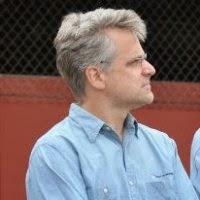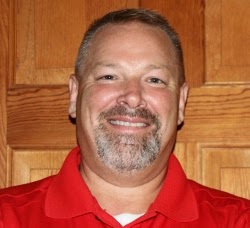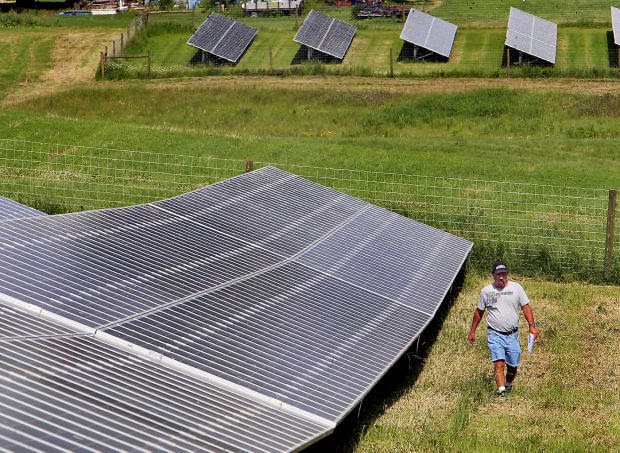by jboullion | Jul 21, 2014 | Uncategorized
Based on a July 18, 2014 article by Chuck Quirmbach on Wisconsin Public Radio
The Alliance for Solar Choice, a solar industry trade group, has scorned three Wisconsin utility’s attempts to harm solar companies through their respective proposed rate restructuring. All three rate proposals include a planned increase in customer’s fixed charges, while offering a small decrease in the price of energy use per kWh.
The Alliance for Solar Choice represents many members of the rooftop solar industry and believes that We Energies’ (along with WPS and MGE) plan would stop customers from having installers lease them solar panels. Alliance president Bryan Miller believes that utilities are adopting the philosophy of “if you can’t stop it, monopolize it” by assuring that rooftop solar is more economical through the utility. We Energies has also unveiled a solar panel leasing ban, further adding to the calamity felt by solar contractors. The utility waited to propose this ban after the deadline for groups to formally intervene in the rate case before the Public Service Commission, the entity that would review the proposal. According to Miller, “the way they did this shows you really what the character of this company is about.”
We Energies spokesperson Cathy Schultze said her company followed standard procedures for rate cases, stating that “the same amount of time that usually transpires went down in this case.” Further, Schultze stated that the increase in fixed charges is fairer to customers who can’t afford or don’t want solar panels, a surprising statement considering that the 1,450 MW of residential solar installations across the country since 2000 have been overwhelmingly occurring in middle-class neighborhoods that have medium incomes ranging from $40,000 to $90,000 (read the Center of American Progress report here).
Read the entire article here
by jboullion | Jul 18, 2014 | Uncategorized
The following article by Dan Shaw was featured in the Daily Reporter on July 16, 2014:
The owner of a solar-power company is expressing grudging admiration for what he described as We Energies’ latest attempt to fend off competition from businesses such as his.
Matt Neumann’s company, Pewaukee-based SunVest Solar Inc., filed documents with utility regulators Tuesday to formally oppose We Energies’ request to modify the rates charged to its gas and electricity customers. Neumann and his colleagues are particularly concerned about a proposal that, he contends, would provide fair compensation for the production of renewable energy only to those who own the generation equipment they get power from.
In other words, Neumann said, We Energies’ request is a direct assault on third-party ownership, an arrangement that lets an independent company own solar panels or other devices installed on a customer’s property. He said he has many reasons to dislike We Energies’ proposal, but he can at least appreciate the strategy.
If regulators approve the request, Neumann said, We Energies will have taken away the sting from any law state legislators might approve making third-party ownership explicitly legal in the utility’s service territory.
“We are going to be doing away with third-party ownership,” he said. “Even if there is legislation, the rate structure won’t allow it.”
Renewable-energy advocates often tout third-party ownership as the best way to overcome what they say is the greatest barrier to more widespread use of solar panels and similar devices: the high upfront costs of installation. Third-party ownership is explicitly allowed in many states, often providing a spur to the construction of renewable-energy projects, but the arrangement is in a legal gray area in Wisconsin.
Wisconsin regulators have opined that any independent business that sells power directly to a customer is a public utility and thus cannot compete directly with We Energies or other companies that have monopoly rights to certain parts of the state. Even so, officials have not cracked down on various third-party arrangements that are set up using leases rather than direct purchases of electricity.
Two state lawmakers, Reps. Chris Taylor, D-Madison, and Gary Tauchen, R-Bonduel, introduced a bill in March that would lay out the circumstance in which third-party ownership would be legal. But the bill never made it to a debate because the Legislature was about to recess for the rest of the year.
Until such legislation is passed, the assumption among utility officials is that third-party ownership is not permitted in Wisconsin, said Brian Manthey, a spokesman for We Energies. He said the utility’s request is in keeping with that assumption.
“We have to go with what state law is right now,” Manthey said. “We can’t predict what any future policy might be.”
Renewable-energy advocates say We Energies’ request is a threat largely because, if approved, it would prevent customers involved in third-party agreements from taking part in what is known as “net metering.” Net metering lets customers receive credit for power they generate but do not consume immediately. They then use that credit to avoid paying for electricity at other times.
Any excess kilowatts produced by solar panels during the day, for instance, can be used to avoid paying for kilowatts obtained from a utility company when the sun is not shining. We Energies’ proposal would offer net metering only to customers who own the generation equipment.
Those who do not own the solar panels or other devices still could lower their energy bills but would not get credit for any excess produced. Neumann and others say most of the economic benefits of third-party ownership would be lost.
A similar effect would result, renewable-energy advocates argue, from proposals contained not only in We Energies’ rate request but in those from two other utility companies in Wisconsin. We Energies, Madison Gas & Electric and Wisconsin Public Service Corp. all have proposed increasing the so-called “fixed charges” that appear on monthly utility bills regardless of how much power customers use.
MG&E, which serves the area around Madison, originally proposed increasing its fixed charge from $10.50 a month to about $21 in 2015, but has since reduced the request to $19. Wisconsin Public Service Corp., which mainly provides power to customers in the northeastern and central parts of the state, is trying to increase the fixed charge to residential ratepayers from $10.40 a month to $25 and from $12.50 to $35 for small commercial customers.
We Energies is proposing a smaller increase, going from about $9 a month to $16. But the utility also would force those who produce their own power to pay a separate “demand charge,” which would be set in accordance with the production capacity of their generation equipment.
Utility representatives contend the fixed charges need to be higher because they historically have not been set at a level that covers the cost of the electrical grid and other equipment needed to deliver electricity to customers. Even those who generate their own power, the argument goes, still need to pull electricity off the grid from time to time and should pay their fair share for the upkeep of that system.
Neumann said he takes the requests, especially We Energies’ proposal to impose an additional demand charge, as further evidence that utilities are trying to protect themselves from competition. Without third-party ownership, he said, the threat to those monopolies is hypothetical.
“We do 95 percent of our work out of state,” Neumann said, “even though we’d rather do our work here.”
by jboullion | Jul 11, 2014 | Uncategorized
This morning, the Iowa Supreme Court handed down a ruling that supports third-party power purchase agreements. This ruling is a win for the solar industry and sets an important precedent for future legal challenges to third-party ownership in other states, such as Wisconsin.
The following article posted on Business Record’s website contains more details regarding the ruling:
Iowa Supreme Court ruling clears way for third-party rooftop solar agreements
Friday, July 11, 2014 10:35 AM
The Iowa Supreme Court issued a ruling this morning that a Dubuque solar energy company did not act as a public utility when it attempted to enter into a third-party power purchase agreement with the city of Dubuque, the Dubuque Telegraph Herald reported.
In a split decision, the court ruled, 4-2, with one abstention, in favor of Eagle Point Solar in the case filed against the Iowa Utilities Board. The ruling is expected to clear the way for additional municipalities or nonprofits, which cannot directly claim solar tax credits, to buy solar energy from non-utility third parties and take advantage of the credits.
Continue reading here…

by jboullion | Jul 8, 2014 | Uncategorized
RENEW Wisconsin members re-elected four directors to its governing board in June.
“We are thrilled that these four re-elected board members will continue to serve RENEW Wisconsin as we collectively work towards our newly adopted mission to lead and accelerate the transformation to Wisconsin’s renewable energy future through advocacy education, and collaboration,” said Carl Siegrist, RENEW’s board president.
The four Directors are:
 Brian Hildebrand, administrator with the UW-Madison Center for Sustainability and the Global Environment as well as with the Center for Climatic Research.
Brian Hildebrand, administrator with the UW-Madison Center for Sustainability and the Global Environment as well as with the Center for Climatic Research.

Niels Wolter, is an independent consultant working with prospective owners of large commercial solar electric systems and is the Managing Director of Encon Services International LLC.
 Greg Fritsch, President of Clean Energy North America, a bioenergy and cogeneration project development and consulting company. Greg has been involved in banking, consulting, and energy project development for 25 years.
Greg Fritsch, President of Clean Energy North America, a bioenergy and cogeneration project development and consulting company. Greg has been involved in banking, consulting, and energy project development for 25 years.
 Don Wichert, volunteer advisor to RENEW Wisconsin and independent consultant with Eudai Energy, LLC. Don has been involved with renewable energy in Wisconsin for over 30 years with the State Energy Office, Wisconsin Energy Conservation Corporation, and RENEW Wisconsin as Board Member and interim Executive Director.
Don Wichert, volunteer advisor to RENEW Wisconsin and independent consultant with Eudai Energy, LLC. Don has been involved with renewable energy in Wisconsin for over 30 years with the State Energy Office, Wisconsin Energy Conservation Corporation, and RENEW Wisconsin as Board Member and interim Executive Director.
These directors will serve three-year terms starting in July 2014 and going through June 2017.

by jboullion | Jun 30, 2014 | Uncategorized

RENEW Wisconsin’s Policy Director, Michael Vickerman attended the unveiling ceremony of the Vernon Electric Cooperative community solar project
Merlin and Trudy Simonson have long been interested in solar energy. They wanted to put solar panels on their home in Genoa but were “afraid we’d do it wrong,” said Merlin, a retired Department of Defense worker. So when their utility, Vernon Electric Cooperative, offered a chance to buy panels in a solar farm, they jumped.
“This could not have come at a better time for us,” Merlin said Wednesday as Trudy signed their name on a few of the couple’s 59 panels in the 2-acre array tucked between farm fields. “Carbon costs are only going to increase.”
They expect their investment will offset about 80 percent of their electric bill, which includes heat for their Genoa home.
John Evenstad doesn’t expect quite so much from his single panel, which he purchased “for the fun of it.”
Both are among 120 owners of the community-owned solar array, the first of its kind in Wisconsin.
“Most of the time these things are somewhere else,” Evenstad said. “You gotta support it because it’s local.”
The solar farm, which went online in May but was formally unveiled in a ceremony Thursday, was largely a response to member interest, said Dave Maxwell, Vernon Electric’s marketing and communications director.
“We had a pretty good hunch that something like this would work,” Maxwell said.
Vernon Electric was able to piggyback on a project by La Crosse-based Dairyland Power Cooperative, which serves the Westby utility and built a 500-kilowatt array that should provide enough power for about 60 homes.
The developer, Colorado-based Clean Energy Collective, took advantage of federal tax credits, and the co-op kicked in a $71 rebate to bring the cost for members down to an even $600 per 305-watt panel — or about $2 per watt.
The panels are under warranty for 25 years but will likely last for 50, Maxwell said.
Panels were available to members of the co-op, who could purchase only as many as would offset their power use.
Members own their panels, though the co-op takes care of maintenance. Computer software tracks the electricity fed into the grid and calculates the credits.
They can keep their panels so long as they live in the co-op service area, and panels can be bought and sold among members.
Richard Case wanted to get in on the action but the panels sold out in only two weeks.
Case said it would be impractical to install panels at his Ontario farm, which is tucked in a valley, but he’d like to be part of the move away from fossil fuels.
 “This is the future,” he said.
“This is the future,” he said.
Clean Energy founder Paul Spencer acknowledged that coal remains the cheapest fuel per kilowatt hour, but solar is becoming increasingly economical as equipment costs have fallen by half in just the last five years.
Today’s panels produce about 30 percent more electricity than they did then.
U.S. solar installation in the past two years has outpaced the previous three decades, according to the Solar Energy Industries Association. In 2013 alone, the nation added 4.7 gigawatts, more than 60 percent of the existing capacity.
As volume increases, Spencer said, prices will become even more competitive.
Unlike coal plants, there’s no ongoing fuel costs for solar farms. And unlike wind, which tends to die on the hot summer afternoons, solar panels perform best when demand is highest.
Zeke Skarlupka and his wife, Kelly, purchased 20 panels, which they expect will cover all their electricity use once they convert to a natural gas water heater.
Living in Genoa, home to one of Dairyland’s two coal-fired plants, Skarlupka is well aware of where his electricity comes from.
Read the rest of the story…
by jboullion | Jun 27, 2014 | Uncategorized
The Wisconsin Rapids Tribune published an opinion piece by Sen. Julie Lassa on June 26, 2014. Below, is an except:
“I had a great time last weekend at the 25th Annual Midwest Renewable Energy Association fair in Custer, in the northeast corner of the 24th Senate District. It’s always a fascinating place to visit, since it brings together thousands of people from all over the country to see the latest in wind, solar, geothermal and other renewable energy technologies, as well as related items such as electric cars, energy efficient fixtures and appliances, sustainable building methods, and so much more.
But while I was pleased to see many local and regional consultants and vendors, I noticed that nearly all the manufacturing of these clean energy systems was happening far away. Just to take solar power as an example: Many of the photovoltaic panels sold by local vendors are manufactured elsewhere — some in other states, some in Germany or China. If there were any solar panels on display that were manufactured in Wisconsin, I missed them.
I found it interesting that the Wellspring Renewable Energy Program, which started in Milwaukee and is dedicated to promoting a buy-local approach to building solar energy markets, has to source its ‘locally manufactured’ solar panels from manufacturers in Minnesota and Illinois.”
Read the rest of Sen. Lassa’s commentary
by jboullion | Jun 13, 2014 | Uncategorized
RENEW Executive Director, Tyler Huebner was interviewed by Tom Breuer for the May issue of InBusiness Magazine
“If you’ve managed to survive even one brutal Wisconsin winter (or unseasonably hot summer), you know that looming utility bills can often creep into your daydreams and nightmares on a moment’s notice, eating away at your peace of mind well before they have your kids’ college fund for lunch.
If you’re a small business owner who pays his or her own heat or electricity, you’ve got double trouble, and in addition to unpredictable weather, unforeseen rate increases can be the difference between shivering in the dark and avoiding a deep freeze.
So imagine if your utility bills ran into the hundreds of thousands every month instead of the hundreds. Well, there are plenty of Wisconsin ratepayers — big manufacturers and other commercial energy consumers — who don’t have to imagine. They live that reality. And they are skittish about a recent proposal to beef up Wisconsin’s renewable energy mandate from its current 10% threshold to 20% by 2020 and 30% by 2030 — a move that, many believe, would spike energy prices that are already high in comparison to other states.”
Read the rest of the article...
by jboullion | Jun 12, 2014 | Uncategorized
Renewable Portfolio Standard key driver for clean power success
The Public Service Commission (PSC) today approved a report documenting that Wisconsin’s electric providers are already in compliance with their 2015 renewable energy requirements specified in state law.
In 2006, Wisconsin passed a Renewable Portfolio Standard (RPS) requiring utilities to increase their renewable energy supplies by six percentage points from 2006 to 2015, so that the state would reach an overall target of 10%. The report approved today documents that the state’s electric providers have collectively reached the 10% goal two years early. In addition, the report stated that all 118 electric providers are in compliance with their individual metrics for calendar year 2013.
“What a tremendous success for Wisconsin to meet this 10% renewable standard two years early and with virtually no perceptible impact on customer bills,” said Tyler Huebner, RENEW Wisconsin’s Executive Director. “Over the last eight years our renewable energy standard has created new jobs and business opportunities while cleaning up and diversifying our power supply mix.
In 2013, the PSC issued a report with data through 2012 showing the renewable energy standard had less than a one percent impact on electric rates.
Huebner said: “Now that we’ve met the 10% goal, the logical question before us is ‘What’s next?’ The conversation should shift to the Legislature to address that question in 2015. Our neighboring states are moving ahead of us. For example, Iowa now generates 27% of its electricity from wind energy, while the total in Minnesota is now 14%. The renewable energy produced there is helping to keep customer bills low. In addition, Michigan is considering a jump to 30% renewables by 2030. Let’s keep Wisconsin moving forward and get to work on extending and expanding Wisconsin’s Renewable Energy Standard.”
by jboullion | Jun 10, 2014 | Uncategorized
Circuit Court sides with RENEW Wisconsin over key solar policy
In its continuous defense of renewable energy policy in Wisconsin, RENEW Wisconsin, a nonprofit advocacy organization, scored a victory from the Dane County Circuit Court that puts solar energy on a stronger footing going forward.
RENEW challenged a 2012 decision by the Public Service Commission of Wisconsin (PSCW) which specified the maximum size of a solar system eligible for net metering in We Energies’ electric territory would be 20 kilowatts. At that time, most of the other investor-owned electric utilities in Wisconsin had a cap of 100 kilowatts, and RENEW argued that We Energies should also have a cap at that level. Net metering is a policy that allows solar customers, including residents, businesses, schools and other public agencies, to receive full retail credit for the excess energy they deliver to the grid. A smaller net metering cap limits the ability of larger business customers to power themselves with clean energy.
Agreeing with RENEW Wisconsin, the Dane County Circuit Court found that the PSC’s decision to keep the net metering cap at 20 kilowatts was arbitrary and unsupported in the factual record. This decision was remanded back to the PSC.
“Better net metering policies will enable more businesses to save money with solar power. Renewable energy has never been as attractive to customers as it is today, and businesses nationwide are adopting solar energy as a way to control their energy costs, businesses like Wal-Mart and Kohl’s. Moreover, it is important that we promote and defend Wisconsin renewable energy in all decision-making venues and make sure decisions are made based on the facts presented in each case,” said Tyler Huebner, RENEW Wisconsin’s Executive Director.
by jboullion | Jun 6, 2014 | Uncategorized
This article published by Kenosha News highlights opportunities for job creation in Wisconsin in the renewable energy industry and features quotes from RENEW Wisconsin’s Tyler Huebner.
There could be more jobs for Wisconsin in clean energy
Published by Steve Lund of Kenosha News on 6/4/2014
The president’s announcement Monday about the Clean Power Plan should be good for renewable energy in Wisconsin over the long term, but don’t expect a wind farm project in Kenosha County any time soon.
In the president’s plan, the Environmental Protection Agency would require states to reduce carbon emissions from existing coal-burning and gas-burning power plants by 30 percent from their 2005 levels.
Solar power, wind power, bio fuels and other sources of electricity that don’t involve burning fossil fuels should benefit from the rules, as should efforts to conserve electricity.
“Between now and 2030, it should be very beneficial for energy efficiency and renewable energy,” said Tyler Huebner, executive director of Renew Wisconsin, a non-profit organization that advocates for renewable energy and represents businesses that create renewable energy.









